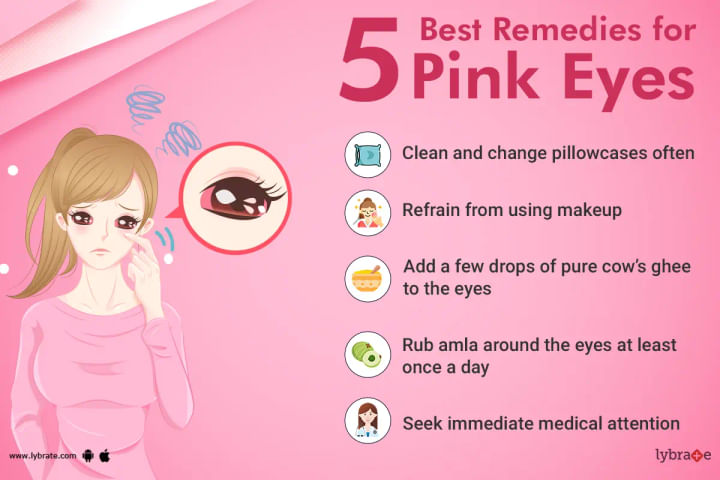Quick Home Remedies for Conjunctivitis (pink eye)
What is Conjunctivitis?
An inflammation of the conjunctiva, sometimes known as pink eye, is medically referred to as conjunctivitis. The conjunctiva is a thin, transparent covering that covers the white area of the eye and the inner surface of the eyelids. Pink eye is a frequent name for this condition. It is a condition that can be brought on by either an infection caused by viruses or by bacteria.
What are the signs and symptoms of Conjunctivitis?
The following is a list of common signs and symptoms of conjunctivitis:
- Redness and Swelling of the eyelid and the white part of the eye
- Pain, itching, or burning in one or both eyes
- abnormally large amounts of tears or discharge coming from either one or both eyes
- Blurred vision
- Sensitivity to light (photophobia)
- The sensation that something is gritty and embedded in your eye.
- An increase in mucus production
What are possible complications of Conjunctivitis?
Conjunctivitis can have a range of potential complications, including:
- Spread of infection: In the absence of appropriate treatment, the infection has the potential to spread to other regions of the eye.
- Recurring inflammation: Some people may experience chronic conjunctivitis that does not go away with medications.
- Permanent eye scarring: Severe cases of conjunctivitis can lead to permanent scarring of the conjunctiva, leading to vision problems and sensitivity to bright light.
- Reduced tear production: Long-term inflammation caused by some types of conjunctivitis can reduce a person’s tear production, leading to increased risk of eye damage over time.
- Infected cornea: An improperly treated case of bacterial or viral conjunctivitis can lead to an infection in the cornea, which can result in vision loss and require surgery for correction or repair.
Quick Home Remedies for Conjunctivitis (pink eye)
- Put a warm compress on the eyes: Applying gentle pressure with a warm, wet washcloth on the eyes can help reduce itching and discomfort.
- Avoid rubbing or touching the eyes: It is important to limit the amount of bacteria that gets near the eye by avoiding any sort of contact. If itching or irritation occurs, let it be and avoid rubbing or touching your eye area.
- Clean and change pillowcases often: Change bed linens and pillowcases frequently to prevent reinfection if you are suffering from bacterial conjunctivitis.
- Refrain from using makeup: Avoid using any cosmetics, especially mascara and eyeliner, while your eyes are inflamed in order to reduce irritation that may worsen symptoms of pink eye - especially when it comes to bacterial conjunctivitis!
- Increase intake of vitamins A & C: Vitamin A helps boost immunity against infection while Vitamin C helps fight off inflammation due to conjunctivitis (pink eye). Increasing intake of these vitamins through natural dietary sources such as spinach, carrots, citrus fruits may help provide relief from pink eye symptoms.
- Make an ayurvedic decoction with triphala, neem, and ghee: Drink this concoction twice daily to reduce inflammation and nourish the eye tissues.
- Cow’s Ghee: Add a few drops of pure cow’s ghee into each eye before bedtime. This will help to relieve itching caused by Conjunctivitis.
- Amla juice: Rub amla juice around the eyes at least once a day to reduce redness and soothe itchiness associated with Conjunctivitis. You can also make a paste of the powder of amla and apply it gently on your eyelids, or drink a teaspoon or two of the juice every day for best results.
- Wash your hands regularly: This reduces your risk in spreading the infection to others that may contact you directly or indirectly through items you have touched such as door knobs or phones etc..
- Cold compresses: Place cold compresses on your eyes every few hours for about 10-15 minutes at a time throughout the day to reduce discomfort from Conjunctivitis symptoms such as irritation and swelling in the eye area and redness around the eyes.
- Seek immediate medical attention: If you develop any inflammation, pain, discharge from your eyes, itchiness or light sensitivity, you should immediately see a doctor for treatment.
- Keep away from anyone who is suffering from conjunctivitis: Since it is highly contagious during its active stages, you should avoid coming in contact with conjunctivitis patients.
- Wear sunglasses: When going outside, wear sunglasses since sunlight can make infection worse.
What are the surgical treatments for Conjunctivitis?
The surgical treatments for Conjunctivitis depend on the type of conjunctivitis and severity of the condition. The two main forms are bacterial and allergic conjunctivitis.
For bacterial conjunctivitis, surgery may be an option if medical treatment has failed or if there is a contaminant present. This can involve scraping the affected conjunctival membrane to reduce the presence of bacteria and applying a topical antibiotic to prevent further infection.
For allergic conjunctivitis, surgery may involve draining away excess fluid or removing tissue that has built up due to inflammation caused by allergens.
Ocular surface reconstruction: it may also be done to reduce ocular discomfort associated with allergies. Surgery in this case is usually done as a last resort when medications have not alleviated symptoms sufficiently.
Best doctors to consult for Conjunctivitis?
- Ophthalmologists: An ophthalmologist is a type of medical specialist that specialises in the diagnosis and treatment of eye illnesses and disorders like conjunctivitis. Conjunctivitis is one of these diseases and disorders. They are able to prescribe medications to assist minimise the symptoms of the condition, and they are also able to provide advice on preventative actions to help reduce the number of outbreaks.
- Optometrists: optometrists are healthcare professionals who specialise in primary eye care services such as vision testing, contact lens fittings, eyeglass prescriptions and management of certain eye diseases, such as conjunctivitis.
- General Practitioners (GPs): GPs are trained to diagnose and treat a variety of illnesses or conditions related to different organs in the body, including eyesight problems such as conjunctivitis. GP’s may refer individuals for specialised testing for further examination if necessary or earlier diagnosis is desired.



+1.svg)
